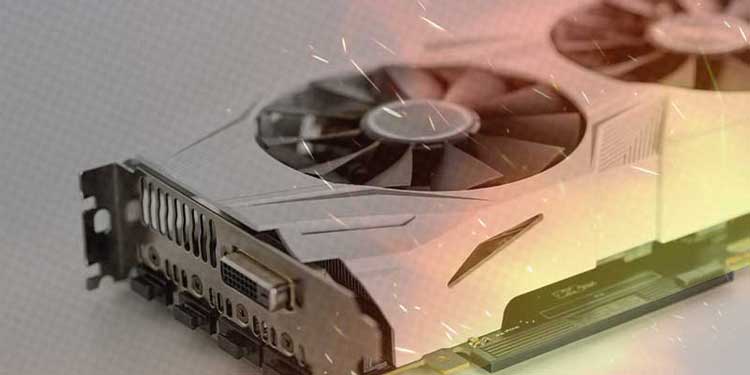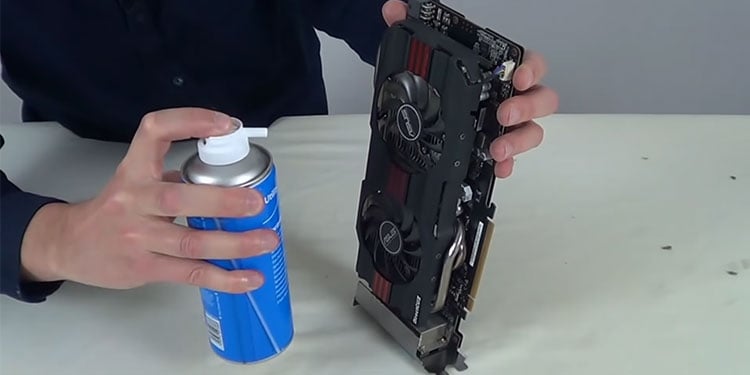If you’re considering using your GPU to mine crypto, consider whether it’s worth the strain on the device and the electricity cost compared to what you’ll make.
How Does Crypto Mining Work?
For those who aren’t highly familiar with cryptocurrency, it can be a confusing topic to understand. However, it is essential to understand how the process affects a graphics card. If you decide to mine Bitcoin, for example, your GPU – and any other graphics cards hooked into the system and tasked with this purpose – work toward generating hash strings by solving problems having to do with transactions made on the network. Boiled down, your computer does calculations and gets paid for doing them. When your GPU does hard work like mining, it generates heat. Heat is the issue that so many miners come up against when trying to maintain their hardware. Usually, your graphics card gets a chance to cool down between games or when running lower-priority programs. However, your GPU and CPU will get a heavy workout when mining crypto, which is one reason why it’s important to pick the right components. When you mine crypto, your card is running on very high settings at almost all times. It doesn’t get a chance to cool down and work at a slower pace. Of course, this can increase burnout on your hardware.
Why Do People Use GPUs for Crypto Mining?
People use graphics cards for mining instead of CPUs because they can get more work done in a given clock cycle. Though they may cost more, the sheer volume of work they can do is so much larger than the cost difference makes up for it. They’re designed to do a lot of difficult work, and that really shines during crypto mining. The faster the work is done, the more cryptocurrency a given system can mine. Since it can take a long time to earn crypto during this process, it’s crucial to have the most efficient method possible. If you don’t, you’re probably not making as much money as you’d need to be to maintain the system.
Crypto Mining and GPU Damage
There are two significant ways that mining crypto can damage your GPU. These are heat and uptime.
Heat and GPUs
Most graphics cards get very hot when they’re working hard. If you track your temperatures, you’ll see that they generate heat up to and over 80 degrees Celcius. This is a very high temperature, and while it may be safe for the GPU, the heat still increases the wear on it. At a specific temperature that may damage the unit, it will actually shut down to protect itself. However, running it at a high and safe temperature for a long time can still warp the unit, damage the internals, and dry up the thermal paste. These will eventually lead to the GPU dying – though no graphics card will last forever.
Uptime and GPUs
Another problem you might run into when mining for crypto is how much the graphics card is in use. It isn’t like displaying your desktop background. When you leave it in use mining crypto, it is working at a fast speed at all times. All hardware will eventually die, and graphic cards are no exception. The more you use something, the more wear and tear you place on it. So it may seem that your GPU dies sooner when you use it for mining crypto instead of gaming or everyday computing. Uptime is actually a more significant problem for GPUs used to mine crypto than heat. You can lower the heat by adjusting the settings on the graphics card. However, many miners prefer to keep their cards active as much as possible to maximize their crypto payments.
How to Protect Your GPU During Crypto Mining
You can do things to protect your GPU and extend its life while mining crypto. Doing this might help you make more money in the long run since your GPUs will last longer, and you won’t have to purchase expensive replacements.
Use the Right Settings
When setting up your computer for mining, don’t jump straight in before learning how to do it. Experienced crypto miners say that you can keep the temperature relatively low with the proper settings rather than reaching close to the max temperatures that it’s capable of. This should help it to stay functional longer. Crypto mining is a complex world to step into. Don’t start without learning everything you can before joining a mining pool. You may be able to protect more of your investment that way.
Replace Your Thermal Paste
All GPUs have thermal paste or pads to help keep their components cool. These act as both a lubricant and a way to move heat away from sensitive parts. The longer you use a graphics card, the more likely the thermal paste has dried up. You might notice that the temperatures on a GPU are creeping up more often when the paste or pads need to be replaced. If you’re mining and the GPU is active regularly, keep a close eye on the temps to know when to replace the thermal paste or pads.
Keep It Clean
You don’t want your graphics card to be caked in dust or dirt. Instead, you want the fans free of any debris and the card itself to be clean. Not only can dust clog up the fans and prevent them from working correctly, but it can also increase the card’s heat. If your system is dusty somewhere, make sure you open it up and dust it regularly. Don’t leave it on your components. You should also keep your system somewhere relatively cool so that it doesn’t have to work against the room’s ambient temperature to keep the GPU temperate.
Reduce the Power Limit
If you cap the power the GPU can draw, you keep it cooler. Each graphics card has related software you can use to adjust how much power it draws, what the clock speed is, and the max temperature. Doing this can help it last longer. Reduce the power limit down to 70 or 80 percent of the max and see what kind of difference it makes in your temperatures. You might be surprised how much cooler things can run. You can also set a max temp or lower the voltage. It might not mine quite as effectively, but
Track Your Temperatures
Keep track of your GPU temperatures to catch problems before they become real issues. If you notice your temperatures are creeping up, you can check to see whether it’s dirty or needs new thermal paste sooner rather than later. Get used to having monitoring software that reports the temperatures of your GPUs up on the screen. Get a clear idea of the standard temperature to know if it changes.
Make Good Use of Cooling
Consider using a higher-end air cooler that can move more air. You can also look for an all-in-one or custom liquid cooler. These might keep it cooler than the stock fans on it alone. Make sure you’re using good fan management in your case and that you have plenty of places for cool air to come in and hot air to go out.
How Long Will a GPU Last Mining 24/7?
A graphics card can last for years, even if it’s operating all day, every day. The critical thing to remember is that temperature management will make a big difference. A card running all day at 65 degrees Celcius and a card running all day at 80 degrees Celcius will be different at the end of a few years.
Is GPU Mining Still Profitable?
You probably aren’t going to make much if you use your gaming PC’s GPU to mine cryptocurrency. Many people participate in pools where their cards all work together to try and do the necessary work, then share the reward. However, a single GPU in a large pool won’t be that profitable either. You may not even cover your electricity cost. It’s essential to know how much you can make and how much mining will cost you before starting.
Can Mining on a Laptop Damage It?
The high heat and constant work that it takes to earn profit by crypto mining isn’t going to be suitable for your laptop and will certainly shorten its life. Laptops don’t have the same heatsinks and thermal options as desktop PCs. You probably shouldn’t use your laptop to mine crypto. It isn’t worth the risk to your hardware when compared to the small amount of money you might make using a laptop.




